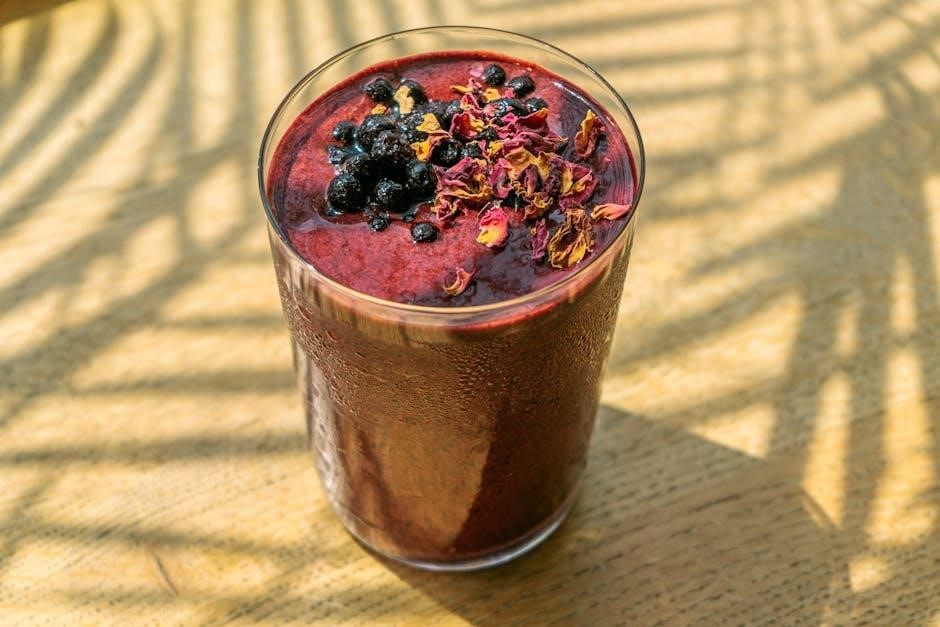Heal Wellness Nutrition focuses on balanced eating‚ proper hydration‚ and mental well-being․ It emphasizes macronutrients‚ hydration‚ and the role of nutrition in mental health․ Motivational techniques and awareness are key․
Understanding the Basics of Wellness Nutrition
Understanding the basics of wellness nutrition involves focusing on whole‚ nutrient-dense foods‚ hydration‚ and mindful eating habits․ It emphasizes balance‚ portion control‚ and avoiding extreme dietary restrictions․ Proper nutrition supports both physical and mental health‚ while poor choices can lead to chronic conditions․ Setting boundaries and using motivational techniques help maintain healthy habits‚ promoting overall well-being and resilience․ Awareness of nutritional needs is key to making informed decisions for long-term health․

Key Components of a Balanced Diet
A balanced diet includes essential nutrients like carbohydrates‚ proteins‚ and fats‚ along with vitamins and minerals․ Proper hydration and portion control ensure optimal health benefits and energy levels․
Macronutrients: Carbohydrates‚ Proteins‚ and Fats
Macronutrients are essential for energy and bodily functions․ Carbohydrates provide energy‚ proteins build and repair tissues‚ and fats support brain health and hormone production․ Balancing these nutrients ensures proper metabolic function and overall well-being․ They are vital for maintaining energy levels‚ supporting physical activity‚ and promoting long-term health․ A balanced intake of these macronutrients is crucial for optimal wellness and disease prevention‚ as highlighted in wellness nutrition guidelines․
Micronutrients: Vitamins and Minerals
Micronutrients‚ including vitamins and minerals‚ are vital for maintaining proper bodily functions․ They support energy production‚ immune function‚ and overall health․ Key vitamins like C‚ D‚ and B complexes‚ along with minerals such as calcium‚ iron‚ and zinc‚ play essential roles in preventing deficiencies and promoting wellness․ A balanced intake ensures optimal metabolic processes and helps prevent chronic diseases‚ making them a cornerstone of heal wellness nutrition practices․
Trends in Wellness Nutrition

Current trends emphasize superfoods‚ plant-based diets‚ and personalized nutrition․ These approaches focus on enhancing overall health and addressing individual needs through tailored dietary strategies․
Popular Diets and Their Benefits
Popular diets like the keto‚ Mediterranean‚ and plant-based diets are widely recognized for their health benefits․ The keto diet promotes fat loss and improves blood sugar control‚ while the Mediterranean diet supports heart health and longevity․ Plant-based diets reduce inflammation and promote gut health․ These diets emphasize whole foods‚ sustainable practices‚ and long-term well-being‚ making them appealing for those seeking balanced nutrition and improved health outcomes․
The Role of Superfoods in Wellness
Superfoods‚ such as berries‚ leafy greens‚ nuts‚ seeds‚ and fatty fish‚ play a vital role in wellness by providing essential nutrients․ Rich in vitamins‚ minerals‚ and antioxidants‚ they help reduce inflammation‚ improve heart health‚ and boost immunity․ Incorporating superfoods into meals enhances overall wellness and reduces the risk of chronic diseases‚ making them a key component of a balanced and nutritious diet for long-term health benefits․

Meal Planning for Optimal Health
Meal planning ensures balanced nutrition‚ prevents unhealthy choices‚ and saves time․ It promotes healthy eating habits‚ supports weight management‚ and enhances overall well-being through structured nutrition․
Creating a Nutritious Meal Plan
A nutritious meal plan involves balancing macronutrients and micronutrients while considering personal health goals․ Start by assessing dietary needs‚ setting realistic objectives‚ and planning meals around whole foods․ Incorporate variety to ensure diverse nutrient intake․ Use tools like carb calculators for precision‚ especially for conditions like diabetes․ Prioritize hydration and include healthy snacks to maintain energy levels․ Regularly review and adjust the plan to stay on track and promote long-term health benefits․
Portion Control and Calorie Management
Practicing portion control and managing calories is essential for maintaining a healthy diet․ Use smaller plates to avoid overeating and measure food portions to stay accurate․ Pay attention to calorie-dense foods and balance them with lower-calorie options․ Avoid distractions while eating to prevent mindless consumption․ Track intake regularly to ensure alignment with health goals․ Balancing calories in and out supports weight management and overall well-being‚ making it a cornerstone of effective nutrition planning․
The Importance of Hydration
Proper hydration is vital for bodily functions‚ energy levels‚ and overall health․ Water intake supports digestion‚ circulation‚ and toxin removal․ Aim for 8 glasses daily for optimal well-being․
Water Intake and Its Impact on Health

Adequate water intake is essential for maintaining proper bodily functions․ It supports digestion‚ circulation‚ and toxin removal‚ while also improving skin health and energy levels․ Even mild dehydration can impair physical performance and mental focus․ Drinking enough water helps regulate body temperature and lubricate joints․ Aim for at least 8 glasses daily‚ adjusting for activity levels and climate․ Proper hydration is a cornerstone of overall well-being and vitality․
Healthy Beverage Options
Choosing healthy beverages is vital for wellness․ Opt for water‚ herbal teas‚ or plant-based milks like almond or oat․ Limit sugary drinks‚ including sodas and sweetened juices․ Incorporate beverages rich in antioxidants‚ like green tea‚ to boost metabolism and immunity․ Coconut water and vegetable juices can provide essential minerals․ Be mindful of portion sizes and added sugars‚ even in natural beverages‚ to maintain a balanced intake and support overall nutrition goals effectively․
Mental Health and Nutrition

Nutrition significantly impacts mental health by influencing brain function and emotional well-being․ A balanced diet rich in nutrients helps reduce stress and anxiety‚ promoting mental clarity and stability․

The Link Between Diet and Mental Well-being
Diet plays a crucial role in mental health‚ as nutrients directly influence brain function and emotional well-being․ A balanced intake of omega-3 fatty acids‚ vitamins‚ and minerals supports neurotransmitter production‚ reducing the risk of anxiety and depression․ A deficiency in these nutrients can impair cognitive function and mood regulation․ Conversely‚ consuming processed foods and added sugars may lead to inflammation and energy crashes‚ exacerbating mental health challenges․ Prioritizing whole‚ nutrient-rich foods fosters resilience and improves overall mental well-being․
Nutritional Strategies for Stress Management
A healthy diet is essential for managing stress․ Staying hydrated‚ incorporating omega-3 fatty acids‚ and consuming magnesium-rich foods can help regulate stress hormones․ Foods high in fiber support gut health‚ which is linked to mental well-being․ Antioxidants and lean proteins also play a role in balancing cortisol and serotonin levels‚ promoting emotional stability․ A structured meal plan with these nutrients helps mitigate stress and enhances resilience․

Physical Activity and Nutrition
Physical activity and nutrition are interconnected․ Exercise increases calorie burn‚ while proper hydration and balanced meals fuel the body․ Together‚ they enhance overall health and energy levels․

How Exercise Impacts Nutritional Needs
Regular physical activity increases calorie expenditure‚ boosting the body’s demand for essential nutrients․ Exercise enhances metabolism‚ requiring adequate protein‚ carbohydrates‚ and hydration to replenish energy stores and support muscle repair․ Proper nutrition ensures optimal performance‚ recovery‚ and overall health․ Without sufficient intake‚ individuals may experience fatigue‚ decreased performance‚ or muscle loss․ Balancing nutrition with exercise is crucial for achieving fitness goals and maintaining well-being․
Balancing Calories In and Out
Balancing calories involves managing the intake and expenditure of energy to maintain a healthy weight and support overall well-being․ Proper nutrition ensures sufficient energy for physical activity‚ while exercise helps burn excess calories․ Monitoring portion sizes and avoiding high-calorie foods are key strategies․ This balance prevents weight gain or loss‚ promoting long-term health and vitality․ Regular physical activity and mindful eating are essential for maintaining this equilibrium effectively․

Sleep and Recovery
Adequate sleep is crucial for recovery‚ supporting physical health and mental well-being․ It enhances repair processes‚ boosts energy‚ and improves cognitive function‚ essential for overall wellness and vitality․
The Role of Sleep in Overall Health
Quality sleep is essential for protecting mental health and physical health‚ ensuring better quality of life‚ and maintaining safety․ Ongoing sleep deficiency can lead to impaired cognitive function‚ weakened immunity‚ and increased risk of chronic diseases․ Prioritizing adequate sleep supports recovery‚ enhances cognitive function‚ and improves mood regulation․ Aim for 7-9 hours nightly and establish a consistent sleep routine to promote overall well-being and resilience․
Nutrition Tips for Better Sleep Quality
Optimize sleep quality by incorporating tryptophan-rich foods like lean meats‚ fish‚ and dairy․ Include complex carbohydrates and healthy fats in evening meals to promote serotonin and melatonin production․ Avoid stimulants like caffeine and sugary snacks close to bedtime․ Stay hydrated throughout the day but limit fluids before bed to prevent disruptions․ A balanced diet supports restorative sleep‚ enhancing overall well-being and energy levels․
Setting Boundaries for Health
Setting healthy boundaries supports mental and physical well-being by prioritizing self-care and maintaining work-life balance․ Clear limits help reduce stress and promote sustainable health habits effectively․
Creating Healthy Boundaries for Wellness
Creating healthy boundaries is essential for maintaining mental and physical well-being․ It involves setting clear limits to protect your time‚ energy‚ and priorities․ Healthy boundaries foster a balanced lifestyle‚ reducing stress and promoting sustainable health habits․ By communicating your needs effectively‚ you can establish a supportive environment that aligns with your wellness goals․ Prioritizing self-care and work-life balance ensures long-term health and resilience․
Motivational Techniques for Behavior Change
Motivational techniques‚ such as goal setting and progress tracking‚ empower individuals to adopt healthier habits․ Techniques like positive reinforcement and accountability encourage consistent behavior change․ These strategies help individuals overcome ambivalence and build confidence in their ability to improve their health․ By aligning actions with personal values‚ motivational techniques foster sustainable lifestyle changes‚ leading to improved nutrition and overall well-being․
